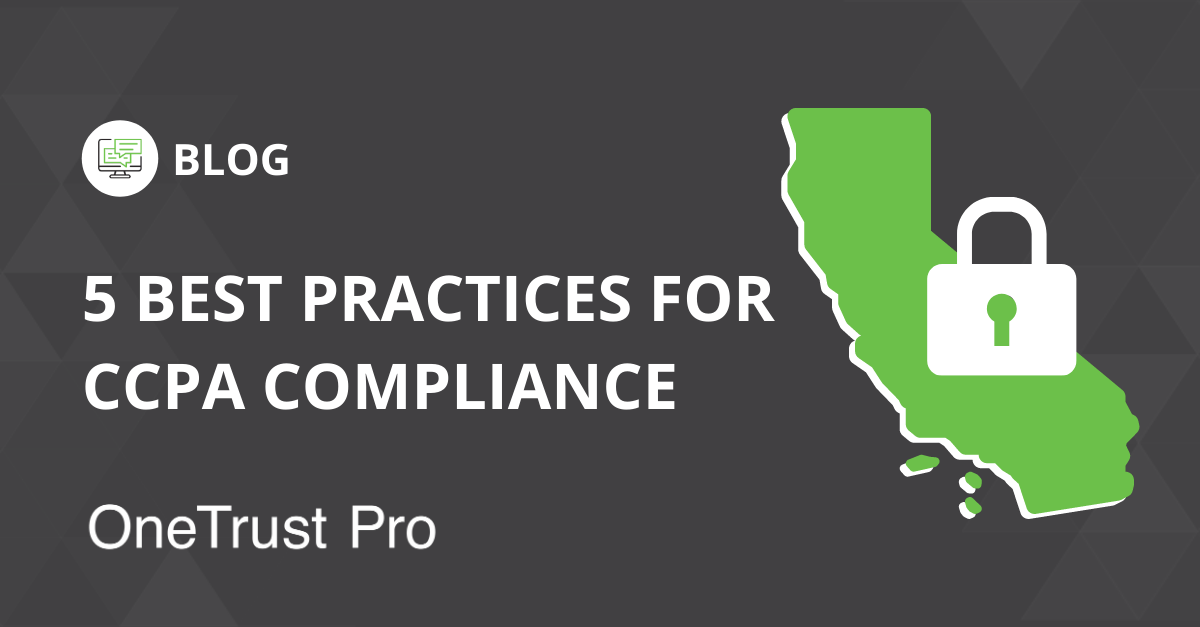The California Consumer Privacy Act (CCPA) is a bill that was passed to give California residents more control over the collection and sale of their personal information. Effective Jan. 1, 2020, the CCPA gives California-based customers the right to know and access, the right to request deletion, and the right to opt-out of the sale of personal information companies have stored.
With the CCPA in effect, companies need to build their privacy program with compliance at the forefront of everyone’s mind. In this blog post, we will go over the five best practices for CCPA compliance.
Learn how your growing business can become CCPA compliant with OneTrust Pro for CCPA.
Step 1: Train Your Employees on CCPA Requirements
As part of the CCPA requirements, employees at a company that deals with elements of the CCPA must have training. Those who handle customer questions on privacy practices at their company and those who deal with CCPA compliance need to be trained on CCPA requirements. They need to be fully aware of the company’s process for dealing with consumer rights so they can adequately handle and fulfill consumer rights requests.
The CCPA does not lay out the measures that need to be taken to fully train an employee. There are a few options that a company could choose, such as getting training materials from the International Association of Privacy Professionals (IAPP), enrolling your company in OneTrust Pro Awareness Training, or developing your own training materials for your company.
Step 2: Easily Fulfill Privacy Requests with Automation
Once your employees are entirely trained on the CCPA requirements, it is time to fulfill privacy requests. Now, you and your team could get knee-deep in the whirlwind of email and spreadsheets, or you could simply automate your privacy requests.
But why would you bother with all that fuss when you can just automate your privacy program?
Automation tools such as OneTrust Pro Privacy Requests and Notices and OneTrust Athena AI (Artificial Intelligence) are specifically designed to make your work life more comfortable. These tools allow you to harness the power of artificial intelligence to automate your privacy program, saving you hours sorting through requests.
Learn how your growing business can become CCPA compliant with OneTrust Pro for CCPA.
Step 3: Keep Your Consent Collection Points and Records Up to Date
As the privacy requests start rolling in by the thousands, ensuring your consent collection points and records are up to date can fall by the wayside. But this step is vital: more consumers are becoming aware of their privacy rights and the desire to have more insight into their data, and a more personalized way of communication grows.
Thus, data collection, storage, and usage are necessary for a successful CCPA compliant privacy program. As businesses of all sizes grow their customer base, knowing that your data records are up to date is essential. Software like OneTrust Pro Consent and Preference Management and OneTrust Athena AI tag team to help you keep your consent collection points and records up to date.
Step 4: Regularly Review & Update Your Privacy Policies
With the CCPA in effect and CCPA 2.0 well on the way, organizations are facing challenges in managing their privacy policies. Ensuring that your program has policies to address continually changing regulations has become a problem area for even the most well-equipped businesses.
The OneTrust Policy and Notice Management solution allows you to simplify policy creation, updates, and monitoring across all your websites and applications in a central location.
Learn how your growing business can become CCPA compliant with OneTrust Pro for CCPA.
Step 5: Update Vendor Contracts & Incident Response Playbooks to Meet CCPA Requirements
In addition to ensuring your privacy policies are up to date, it is also important to clear off the dust and update your vendor contracts and incident response playbooks to meet CCPA requirements.
Holding onto an outdated vendor contract and not updating your incident response plan can put your privacy program at risk and your company as well. With Incident Response, you can easily conduct due diligence on your vendor contracts and leverage pre-built workflows to ensure your incident response processes meet CCPA requirements.
Wherever you are in your privacy program, it is essential to strengthen your program by using the steps above as a guide. For further information, check out OneTrust Pro for CCPA to have all your CCPA compliance needs met.



